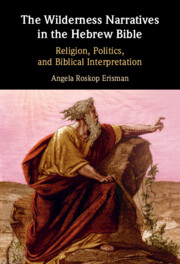Book contents
- The Wilderness Narratives in the Hebrew Bible
- The Wilderness Narratives in the Hebrew Bible
- Copyright page
- Dedication
- Contents
- Preface
- Prologue
- 1 The Journey Begins
- 2 Literature as Politics
- 3 Your God Reigns
- 4 The Sense of an Ending
- 5 The Rhetoric of Fear
- 6 Trusted in My Household
- Epilogue
- Notes
- Bibliography
- Primary Text Index
- General Index
4 - The Sense of an Ending
The Land
Published online by Cambridge University Press: 12 December 2024
- The Wilderness Narratives in the Hebrew Bible
- The Wilderness Narratives in the Hebrew Bible
- Copyright page
- Dedication
- Contents
- Preface
- Prologue
- 1 The Journey Begins
- 2 Literature as Politics
- 3 Your God Reigns
- 4 The Sense of an Ending
- 5 The Rhetoric of Fear
- 6 Trusted in My Household
- Epilogue
- Notes
- Bibliography
- Primary Text Index
- General Index
Summary
This chapter is a reading of the scouts episode (Numbers 13–14). It begins life within the triumphant annalistic version of the wilderness narrative as a positive reconnaissance mission that preceded the conquest of Canaan in Numbers 21. It became a complaint episode when the wilderness narrative was reemplotted as a tragedy, with key features as defined by Aristotle, including error, reversal, recognition, and pathos, as well as a character (Caleb) who steps into the action in order to offer perspective that might help avoid a pathetic ending. The allegorical mode of the wilderness narrative remains active, as Caleb represents Zerubbabel, the Davidide in whom Haggai and Zechariah placed their hope for a restored temple. The return of an actual king was unlikely under Persian rule, but the tragic version of the wilderness narrative uses kingship discourse in order to frame this vision in terms of land, as the series of independent inheritances in Joshua 18–19 is transformed into a bounded territory dominated by Judah and inflected with Davidic resonances.
- Type
- Chapter
- Information
- The Wilderness Narratives in the Hebrew BibleReligion, Politics, and Biblical Interpretation, pp. 94 - 117Publisher: Cambridge University PressPrint publication year: 2024

